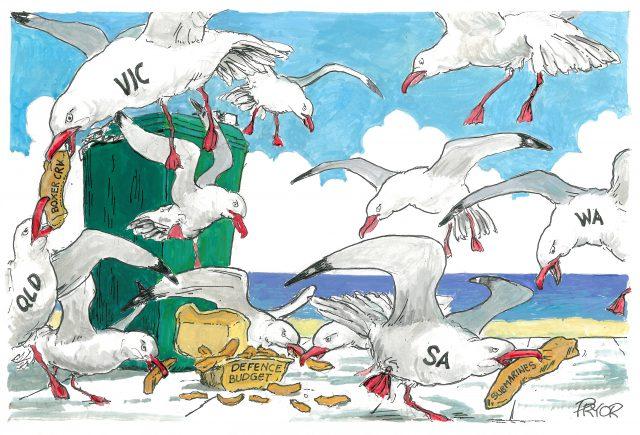The ASPI 2018–19 Budget Brief in brief
Posted By Marcus Hellyer on May 25, 2018 @ 06:00

ASPI has released its annual The Cost of Defence [1] budget brief, the first of the post–Mark Thomson era. As in previous years, this edition seeks to demystify the defence budget, as well as explore some topical issues in more detail. In this post I’ll briefly outline our analysis and suggest where readers should look in the brief for more detail.
The brief begins with a review of our strategic situation in Chapter 1, and draws on the assessments of a number of ASPI analysts. The 2016 Defence White Paper [2] identified six key security drivers that shaped our strategic environment, from US–China rivalry to regional terrorism to the emergence of new technologies. In our view, none of those drivers has improved and most have worsened.
Defence is now confronted with an increasingly broad spectrum of threats. It’s unlikely it can stretch itself to meet all of them, so choices must be made. Unfortunately the white paper doesn’t provide a prioritisation framework. It’s time the government considered a strategic update, either to adjust the white paper’s plan or to confirm that—despite the deteriorating environment—the plan is still the right one.
Chapters 2 and 3 examine the 2018–19 Defence budget itself. Overall the Defence budget is showing healthy growth in real terms and is broadly on track to meet the government’s commitment to increase the defence budget to 2% of GDP by 2020–21.
As planned in the white paper, the bulk of that extra money is flowing into the capital budget. This is necessary if Defence is to be able to afford the future force. And there are a few wrinkles. In particular, sustainment costs seem to be growing faster than Defence expected, and that could draw funding away from capital investment. The pressure on the capital investment budget will likely intensify as shipbuilding projects get up and running.
In Chapter 4 we assess how Defence is going at delivering against the white paper, in particular the future force. Unfortunately, due to decreasing transparency from Defence, it’s difficult to say. Despite the government claiming that it’s making record numbers of approvals, there’s virtually no reporting on what they are. And transparency around the ICT program, which is at the core of Defence’s capability, is non-existent.
This lack of transparency is very concerning. The naval shipbuilding program is a journey that we’re signing ourselves—as well as our children and our grandchildren—up to. The only way it’s going work is if the Australian people support it, and to do that they need to understand it.
To understand it there needs to be informed debate, as well as public confidence that the government is making the right decisions for the right reasons. Otherwise cynicism and parochialism will prevail—as we’re already seeing in public discussion of key investment decisions. To prevent that happening, the government needs to demand that Defence provide greater public transparency in its planning and reporting to support informed understanding and discussion.
In Chapter 5 we examine the government’s policy for Australia’s defence industry. Overall it’s inconsistent. While the stated goal is to deliver better capability for the ADF, in practice it appears the government is committing to local builds without an understanding of the premium and resultant effects on capability.
That said, good things are happening. Overseas primes appear to be putting more skin in the game, and the innovation programs are getting money out the door to help develop good ideas. We suggest that this is an area where Defence could invest more money to help enhance our current capabilities and help grow local small enterprises.
The second issue is the affordability of the naval shipbuilding plan, which we cover in Chapter 6. We’ll discuss this in more detail in future posts, but we calculate that Defence will have spent around $20 billion before it gets the first of the future frigates and submarines into service. That’s a lot of money to have tied up while our strategic situation deteriorates.
Also, continuous shipbuilding will probably need around $3.5–4 billion in annual cash flow. That’s a very big slice of Defence’s capital equipment budget locked up in perpetuity. And the plan locks in a production drumbeat that is probably not efficient, doesn’t deliver capability quickly and will require Defence to keep older capabilities going longer. Overall, Defence may have to trade off other capabilities if it’s to afford the naval shipbuilding plan.
For those of you who’ve wondered why the cost of Defence projects always seems to be so much higher than numbers in Wikipedia, media stories or US budget papers, Chapter 7 talks through a hypothetical example of how Defence actually costs military equipment.
The Strategist will publish further pieces in the coming weeks exploring issues raised in the budget brief. What we cover will be shaped by your responses to the brief. So please email ([email protected]) or tweet if you have questions, comments or refutations and we’ll address them in future posts.
Article printed from The Strategist: https://aspistrategist.ru
URL to article: /the-aspi-2018-19-budget-brief-in-brief/
URLs in this post:
[1] The Cost of Defence: https://www.aspistrategist.ru/report/cost-defence-aspi-defence-budget-brief-2018-2019
[2] 2016 Defence White Paper: http://www.defence.gov.au/WhitePaper/Docs/2016-Defence-White-Paper.pdf
Click here to print.